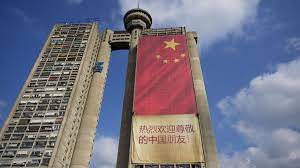By Muhammad Asif Noor, Founder Friends of BRI Forum
President Xi Jinping’s recent visit to Serbia is a renewed promise of a building a significant chapter in the evolving narrative of China-Serbia relations, a partnership flourishing against a backdrop of global uncertainties and shifting geopolitical alignments. This visit, marking profound diplomatic engagements reinforced the traditional bonds between the two nations and paved the way for a future-oriented alliance aimed at mutual development and strategic cooperation. The visit was also coinciding with the 25th anniversary of the NATO bombing of the Chinese embassy in Belgrade, not only symbolizes the resilience and solidarity between the two nations but also highlights their mutual commitment to a strategic partnership poised for a future of shared prosperity. Both sides are eager to deepen ties in a world where alliances are not just about mutual benefits but also about forging lasting partnerships that stand resilient through the challenges of changing international dynamics.
Upon his arrival in Belgrade, President Xi was warmly received which speaks volumes about the depth of the relationship. Serbia’s enthusiastic welcome, with streets adorned in Chinese flags and grand displays of friendship at Belgrade’s Nikola Tesla Airport, reflected the country’s acknowledgment of China as a key partner. The visit was timed to coincide with the 25th anniversary of the NATO bombing of the Chinese embassy in Belgrade, a historical moment that remains a poignant reminder of past grievances and a basis for the solidarity between China and Serbia.
During their meetings, President Xi and Vučić unveiled their vision for the future: the upgrading of their countries’ relationship to a comprehensive strategic partnership. This partnership is now not just about maintaining robust bilateral ties but evolving into a community with a shared future. This concept, initially floated by Xi over a decade ago, has found a receptive audience in Serbia, which views its deepening ties with China as both a strategic necessity and an opportunity for economic revitalization.
The economic contours of the China-Serbia relationship are particularly striking. China has emerged as one of Serbia’s most significant economic partners, infusing the Serbian economy with much-needed investment, particularly in infrastructure and technology. The Belt and Road Initiative (BRI) has been a cornerstone of this economic engagement, with projects like the Belgrade-Budapest railway symbolizing the new silk roads that bind Asia and Europe. These projects are not mere constructions of steel and concrete but bridges of commerce and connectivity, facilitating trade flows across continents and embedding Serbia more firmly within transcontinental trade networks.
Furthermore, the recent implementation of the China-Serbia Free Trade Agreement promises to usher in an era of enhanced economic exchanges. By eliminating trade barriers, this agreement allows for a smoother exchange of goods, ranging from Serbian agricultural products to Chinese technological exports. This trade facilitation is expected to boost Serbia’s export economy, providing it with a gateway to the vast Chinese market, and reciprocally, allowing China to strengthen its economic presence in Europe.
As China is continuously growing its engagement in the Balkan region through its BRI, Serbia is a regional pivotal point for transcontinental outreach. Through the Belgrade-Budapest Railway the travel times is set to reduce and foster greater economic integration between Easter Europe and Asia. Chinese investments in Serbia have been robust, characterized by significant capital injections into infrastructure, energy, and technology sectors.
Cultural and educational exchanges have also been pillars of the China-Serbia partnership. Xi’s commitment to supporting the mobility of young Serbian scientists and students highlights China’s role not only as an economic partner but also as a contributor to Serbia’s human capital development. These exchanges serve as channels for deeper mutual understanding and long-term people-to-people ties, fostering a generation that is aware of each other’s countries and cultures.
Moreover, the recent visit has had a broader strategic dimension, particularly in light of global geopolitical dynamics. In an era where global politics is increasingly polarized, Serbia’s alignment with China sends a clear signal about its foreign policy orientations and its desire for an independent path that is not tethered exclusively to traditional Western alliances. For China, robust ties with Serbia and other Balkan countries provide a strategic foothold in Europe, a continent where its economic and political influence continues to be viewed with caution and competition.
The commitment to building a „community with a shared future“ goes beyond rhetoric. It is about crafting a narrative of cooperation that transcends the transactional elements of international relations. This vision encompasses a commitment to joint prosperity, respect for sovereignty, and the pursuit of a multipolar world where different centers of power coexist harmoniously. For Serbia, this partnership offers an opportunity to balance its relations, leverage its geographic and strategic position, and enhance its international stature.
President Xi’s visit to Serbia has cemented a partnership that is multidimensional and forward-looking. It is a relationship based on mutual respect, strategic cooperation, and a shared vision for the future. As the world navigates through the complexities of international politics and economic uncertainties, the China-Serbia axis serves as a model of how nations can collaborate in ways that respect each other’s sovereignty while promoting common development and prosperity. This partnership not only benefits both nations but also contributes to the larger goal of fostering stability and development across regions, making it a cornerstone of the new era of global diplomacy.

